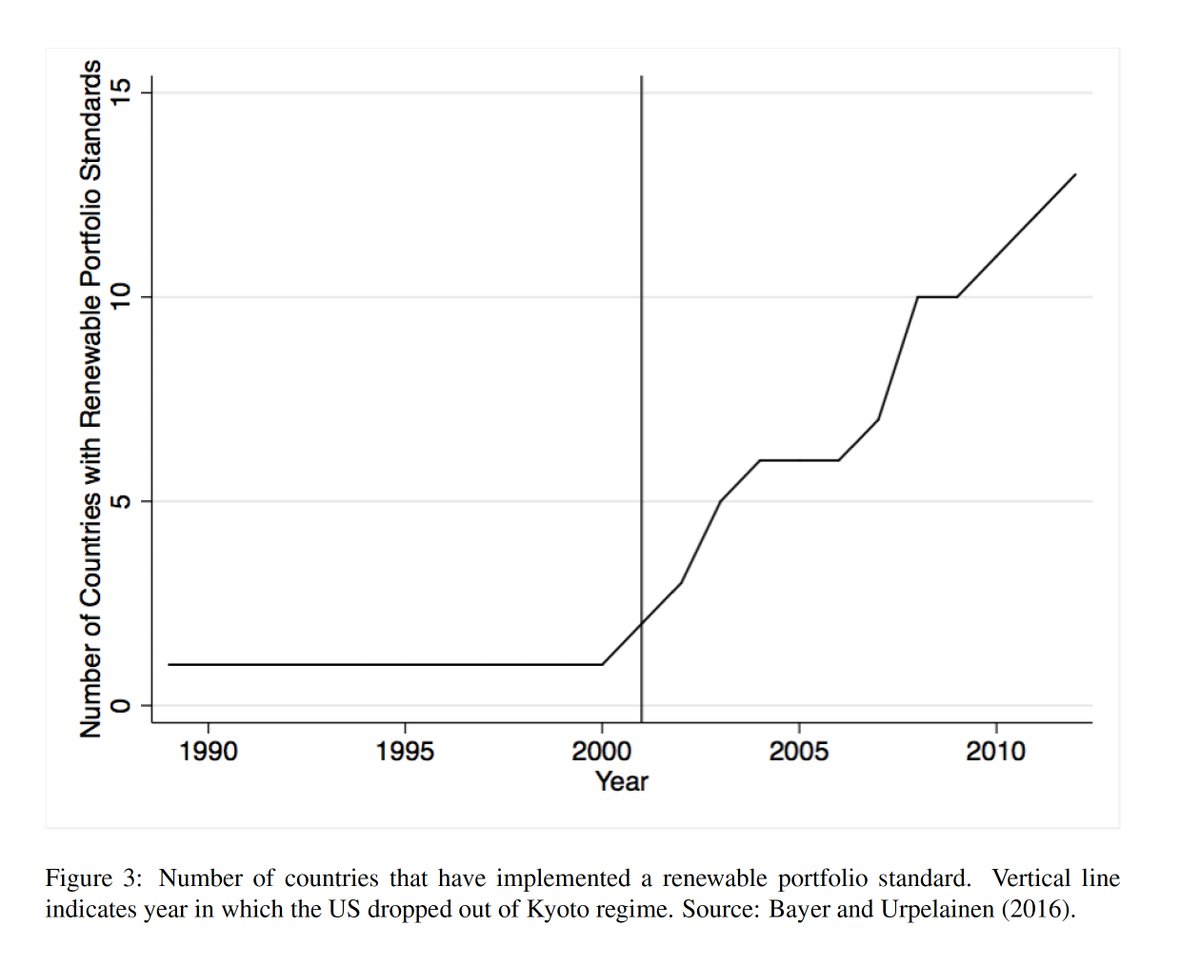Working my way thru @ForeignAffairs issue. Nordhaus calls for climate clubs to promote int’l action. Int’l relations has a lot to add, which is overlooked in his piece.THREAD cc @khar1958 @gernotwagner @adamtooze @robertfalkner @MarkVinPaul @climateopp https://www.foreignaffairs.com/articles/united-states/2020-04-10/climate-club">https://www.foreignaffairs.com/articles/...
1/ Much of past IR theory dominated by game-theoretic models; hence #climatechange became a free-rider problem. Lots of present theory sees it differently. Conditional cooperation is not the main challenge.
2/ One of many excellent figures in @mmildenberger and @MichaelAklin’s work showing nations have acted on climate *irrespective of what other nations do*. Lots of evidence that states are not solely (or even mainly) conditional cooperators on climate. https://papers.ssrn.com/sol3/papers.cfm?abstract_id=3281045">https://papers.ssrn.com/sol3/pape...
3/ STS theorists view climate as a problem of carbon lock-in. The main obstacle to #decarbonization is overcoming mutually reinforcing social, economic and physical systems that keep #fossilfuels at the center of the economy. https://www.annualreviews.org/doi/abs/10.1146/annurev-environ-110615-085934">https://www.annualreviews.org/doi/abs/1...
4/ If carbon lock-in is the prob, we should worry less about free riding and more abt changing preferences & strategies of nations and other actors over time. We need pathways to change rather than compliance mechanisms
5/ Nordhaus climate clubs get willing participants to impose border adjustment tariffs on non-participants: slap a tax on imports from free riding nations.
6/ Nordhaus is correct to identify the prob w/ basing tariffs on carbon content of goods. This will quickly devolve into a mess of measuring emissions associated w/ diff goods, which is VERY difficult. See work by @MichaelWWara and @dcullenward on this.
7/ Instead, he suggests a uniform tariff (3%) and $25 carbon price. This is the sweet spot where non-participation costs > abatement costs. But c pricing does a lot of political work here.
8/ C pricing is a proxy for political commitments. But these can change. @mmildenberger& #39;s new book shows how c pricing has been a political football. When politics change, so does c pricing & that makes climate clubs less stable than models predict. https://mitpress.mit.edu/books/carbon-captured">https://mitpress.mit.edu/books/car...
9/ Instability makes big systems hard to steer. I have detailed the challenges of linking carbon markets, which is part of what Nordhaus’s clubs imply. https://www.nature.com/news/don-t-link-carbon-markets-1.21663">https://www.nature.com/news/don-...
10/ There is also the matter of whether there is sufficient political will among a small group of nations to implement such a scheme. Not clear there is. We need to think abt the incentives of club initiators https://www.nature.com/articles/palcomms201620">https://www.nature.com/articles/...
11/ I’ve argued w/ @BryceRudyk that global fisheries have a different market structure, which lends itself to a club even w/ v limited political will https://www.sciencedirect.com/science/article/pii/S0308597X19303161">https://www.sciencedirect.com/science/a...
12/ Other club models start small or shallow & work toward deeper commitments. David Victor’s “climate accession deals follow this model.” But these can get stuck in the shallow phase and become “pseudo-clubs.” https://link.springer.com/article/10.1007/s10584-015-1481-4">https://link.springer.com/article/1...
11/ Where does that leave us? Focusing on levers for domestic pol action (which vary greatly by nation) to create pressure and incentives for #decarbonization. Tech, learning, experimentation can all help open these pathways. But politics is the slow boring of hard boards. FIN

 Read on Twitter
Read on Twitter


